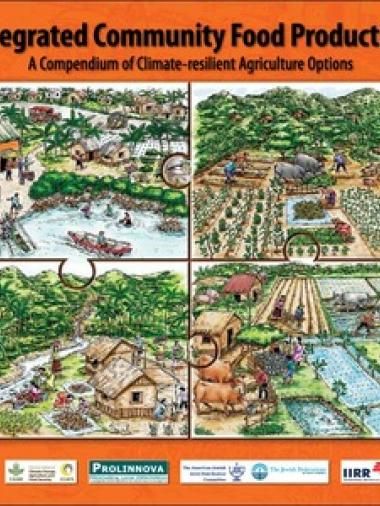Integrated Community Food Production. A Compendium of Climate-resilient Agriculture Options

This compendium of best practices brings together practical ecologically sound and nutrition-sensitive approaches to improving the
productivity of backyard, community and family farms. With the increasing awareness of the importance of safe and healthy diets, there is a
resurgence of interest in these complementary pathways to household level food security
Many of these ideas are not scale neutral and therefore best done on small scale systems. The opportunities for diversification and
intensification are often greater in these backyard and family centered systems. Most of these small scale production systems can quickly be
transformed to chemical-free systems of production.
This compendium has four main sections: the first section is an Overview chapter which provides a conceptual understanding of the
value of agro ecological approaches. It has articles on climate smart agriculture approaches which IIRR has been promoting as part of its
engagement with the global CCAFS network and the Philippine Department of Agriculture AMIA 2 Program. The second section is on
Intensive Organic Gardening. This section includes the very best of the articles that IIRR has produced in its Bio Intensive Gardening
program which it has adapted and refined over three decades and now being promoted nationally through the Department of Education of
the Philippine government. The IDRC Canada (and earlier, UNICEF) has been a big supporter of this approach. The bio-intensive gardening
program includes a tree component that helps create a micro climate in gardens that lowers the ambient temperatures by 2-3 degrees.
Its emphasis on diversity helps turn these gardens into focal points for conserving vegetable diversity. Ways to enhance the nutrition
contributions of gardens receive special consideration. This section on organic gardening is comprehensive and, can serve as the basis
for designing a training program and field level interventions. The third section is on Family Farming. Here IIRR has relied on its own
experiences as well that of other agencies (UPLB, Phil Rice, MBRLC, PRRM, World Neighbors and others) which have contributed articles
to previous source books. Crop production is emphasized mostly those relying on regenerative agriculture approaches. Special efforts
were made to include climate-smart agriculture ideas (agroforestry, conservation agriculture, mitigation opportunities in agriculture etc).
Diversification and sustainable diversification characterizes the approach to family farming. The fourth section is on Small Livestock and
Fish Production. Small scale livestock and fish production systems are highlighted in this section. The concern about hormones and
antibiotic use in meat production is surfacing as a major health concern. Rural communities can meet their own needs (or even supply local
markets) with animals produced in backyards and small farms. Alternative (improved) feeding systems are highlighted in this section (e.g.
pig rations formulated from locally secured products). Low cost housing can help reduce the impacts of rising temperatures on livestock and
along with small fish production systems, can contribute to enhancing protein requirements of families. Organic meat creates special niche
market opportunities for the small producer.
This compendium highlights ways of producing food with a small carbon foot print. Diverse systems of food production are environmentally
sound and as long as climate change remains a threat, there will be a role for these systems. Moreover, as long as a third of the population
(in developing countries) remains poor, and malnourishment prevails, there will be a special role for community level food production. This
compendium features one hundred simple ideas each of which, in a small way, can contribute to climate-smart and nutrition-smart ways of
producing food.
Citación
IIRR, NAPC. 2016. Integrated Community Food Production. A Compendium of Climate-resilient Agriculture Options. Copenhagen, Denmark: CGIAR Research Program on Climate Change, Agriculture and Food Security (CCAFS).